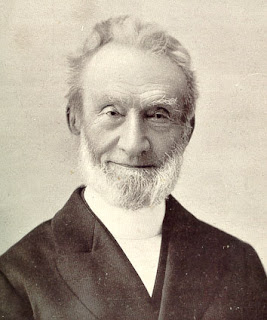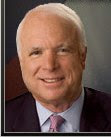 George Muller (Sept. 27, 1805 -- Mar. 10, 1898)
George Muller (Sept. 27, 1805 -- Mar. 10, 1898)
He prayed about and for anything and everything!
He is a man of the WORD, of PRAYER, and of great FAITH!
The following excerpts are taken from George Muller’s personal account. At his young age, George Muller was a thief and a liar, but after turning to Christ, he provided for over 10,000 orphans—without ever asking anyone but God to supply their needs. He testified of at least 50,000 specific answers to his prayers. Through Muller’s experience, we can see how God could use a miserable worm, who was only a wreck when brought to the knowledge of the Lord Jesus Christ.
Muller died at the age of 92 with a wonderful Christ-honoring legacy left behind. Not only did Muller have concern about the physical, emotional, social, and educational needs of the orphans, but also--most importantly--their spiritual needs. Many orphans came to know the Lord Jesus Christ as their personal Savior through his ministry.
Muller himself has stated that through his writing, he wanted God’s people to know that God is forever faithful and He still answers prayers. Muller wanted us to discover how to trust Him, our heavenly Father, who is always willing to supply ANYTHING we need and give ANYTHING we ask (that is according to His will and in the name of the Lord Jesus). He wanted us to know that we can also experience the shower of God’s abundant blessings. (Keep on reading to find out how.)
By God’s grace, I have put it to test to pray for things very specifically. Amazing! (Not the prayer itself that is amazing, but the God who answers the prayer.) When we ask for specific things, God also gives us the specific answers that were sought. “According to your faith let it be to you” says the Lord Jesus in Matthew 9:29. However, I still have many things to learn about prevailing prayer that pleases God. Through His Word, the Lord Jesus is ever ready to teach us. Next time I will post more excerpts which show that:
Muller’s love for God’s Word was the main reason he was a great man of faith and a great man of prayer.
May we, by God's grace, become one of God's "Mullers" today. May we be not found rebuked by our Lord, “Where is your faith?” Instead, may we be found--for the glory of Christ--commended by Him, "Great is your faith.”
*******
So that people would know that his faith was not a unique faith available only to him, Muller wrote in 1842:
I desire that all children of God who read these details may thereby be led to increase and more simple confidence in God for everything they may need under any circumstances. I trust that these many answers to prayer may encourage them to pray, particularly for the conversion of their friends and relatives, their own progress in grace and knowledge, the state of the church of God at large, and the success of the preaching of the Gospel. Especially I affectionately warn them against being led away by the tricks of Satan (see 2 Peter 3:17) to think that these things are unique to me, and that they cannot be enjoyed by all the children of God.
Although…every believer is not called upon to establish orphanages or charities and trust in the Lord for the support of these institutions, yet all believers are called upon, in the simple confidence of faith, to cast all their burdens upon Him (Ps. 55:22). They are to trust in Him for everything (Ps. 37:5; Prov. 3:5), and not only to make everything a subject of prayer, but to expect answers to their petitions that they have asked according to His will and in the name of the Lord Jesus (Matt. 21:22; John 11:22).
Further, when sometimes all has been dark, exceedingly dark, judging from natural appearances, with reference to my service among the saints, when I would have been overwhelmed in grief and despair if I had looked at things “according to the outward appearance” (2 Cor. 10:7), at such times I have sought to encourage myself in God by laying hold in faith of His mighty power, His unchangeable love, and His infinite wisdom. I have said to myself, “God is able and willing to deliver me, if it is good for me; for it is written, ‘He who did not spare His own Son, but delivered Him up for us all, how shall He not with Him also freely give us all things?’ (Rom. 8:32).” As I believed this promise through His grace, my soul was kept in peace.
Also, when in connection with the orphanages and day schools trials have come upon me that were far heavier than the lack of sufficient resources…--at such times, my soul was stayed upon God. I believed His Word of promise, which was applicable to such cases. I poured out my soul before God and arose from my knees in peace, because the trouble that was in the soul was, in believing prayer, cast upon God; thus, I was kept in peace.
Dear reader, I may seem to boast, but, by the grace of God, I do not boast in speaking the way that I do. From my inmost soul, I ascribe the glory to God alone that He has enabled me to trust in Him, and that He has not allowed my confidence in Him to fail. But I thought it needful to make these remarks, lest anyone think that my depending upon God was a particular gift given to me, which other saints have no right to look for, or lest it should be thought that my depending upon Him had only to do with the obtaining of money by prayer and faith.
By the grace of God, I desire that my faith in God might extend toward everything: the smallest of my own temporal and spiritual concerns, the least of the temporal and spiritual concerns of my family, the saints among whom I labor, the church at large, everything that has to do with the temporal and spiritual prosperity of the Scriptural Knowledge Institution, and so forth.
Dear reader, do not think that I have attained in faith (and how much less in other respects) to that degree to which I might and ought to attain; but thank God for the faith that He has given me. Please pray that He will uphold and increase it.
Finally once more, I remind you not to let Satan deceive you in making you think that you could not have the same faith but that it is only for persons who are in a similar situation as I.
May you not do the same, dear believing reader? Oh, I beseech you, do not think that I am an extraordinary believer, having privileges above any other of God’s dear children, which they cannot have. Do not look on my way of acting as something that would not work for other believers. Give it a try! Stand still in the hour of trial, and you will see the help of God, if you trust Him.
But there is so often a forsaking of the ways of the Lord in the hour of trial, and thus the food of faith, the means whereby our faith may be increased, is lost. This leads me to the following important point. You ask, How may I, a true believer, have my faith strengthened? Here is the answer: “Every good gift and every perfect gift is from above, and comes down from the Father of lights, with whom there is no variation or shadow of turning.” (James 1:17). As the increase of faith is a good gift, it must come from God; therefore, He ought to be asked for this blessing. The following means, however, ought to be used:
First, carefully read the Word of God and meditate on it. Through reading the Word of God, and especially through meditation of the Word of God, the believer becomes more acquainted with the nature and character of God. Thus he sees more and more, besides His holiness and justice, what a kind, loving, gracious, merciful, mighty, wise, and faithful God is. He will rely upon the willingness of God to help him because he has not only learned from the Scriptures what a kind, good, merciful, gracious, and faithful being God is, but he has also seen in the Word of God how, in great variety of instances, God has proved Himself to be so. And the consideration of this, if God has become known to us through prayer and meditation on His own Word, will lead us with a measure of confidence, in general at least, to rely upon Him. Thus the reading of the Word of God, together with meditation on it, will be one special means to strengthen our faith.
Second, with reference to the growth of every grace of the Spirit, it is of the utmost importance that we seek to maintain an upright heart and a good conscience; therefore, we should not knowingly or habitually indulge in those things that are contrary to the mind of God. So it is also particularly the case with reference to the growth in faith. How can I possibly continue to ask with faith in God concerning anything if I am habitually grieving Him and seeking to detract from the glory and honor of Him in whom I profess to trust, and upon whom I profess to depend? All my confidence toward God, all my leaning upon Him in the hour of trial, will be gone if I have a guilty conscience and do not seek to put away this guilty conscience, but continue to do the things that are contrary to the mind of God. And if, in particular instance, I cannot trust in God because of guilty conscience, then my faith is weakened by that instance of distrust. For with every fresh trial, faith either increases by my trusting God, and thus receiving His help, or it decreases by my not trusting Him. Then there is less and less power of looking simply and directly to Him, and a habit of self-dependence is born or encouraged. One or the other of these will always be the case in each particular instance. Either we trust in God, and in that case we do not trust in ourselves or in our fellowmen or in circumstances or in anything else; or we do trust in one or more of these, and in that case, we do not trust in God.
Third, if we desire our faith to be strengthened, we should not shrink from opportunities where our faith may be tried, and therefore, through the trials, be strengthened. In our natural state, we dislike dealing with God alone. Through our natural alienation from God, we shrink from Him, and from eternal realities. This tendency cleaves to us, more or less, even after our regeneration. Hence it is that, more or less, even as believers, we have the same shrinking from standing with God alone, from depending upon Him alone, or from looking to Him alone. Yet this is the very position in which we ought to be if we wish our faith to be strengthened. The more I am in a position to be tried in faith with reference to my body, my family, my service for the Lord, my business, and so on, the more I will have the opportunity of seeing God’s help and deliverance. Every fresh instance in which He helps and deliver me will tend to increase my faith. On this account, therefore, the believer should not shrink from situations, positions, or circumstances in which his faith may be tried; instead, he should cheerfully embrace them as opportunities in which he may see the hand of God stretched out on his behalf to help and deliver him, and whereby he may thus have his faith strengthened.
The last important point for the strengthening of our faith is that we let God work for us when the hour of the trial of faith comes, and do not try to work a deliverance of our own. Wherever God has given faith, it has been given, among other reasons, for the very purpose of being tried.
Yes, however weak our faith may be, God will try it, but with this restriction: as in every way, He leads gently, gradually, and patiently, so also with reference to the trial of our faith. At first our faith will be tried very little in comparison with what it may be afterward, for God never lays more upon us than He is willing to enable us to bear (1 Cor. 10:13).
If the believer, therefore, would have his faith strengthened, he must especially give time to God, who tries his faith in order to prove to His child, in the end, how willing He is to help and deliver him, the moment it is good for Him. He…permitted our faith to be tried in order to make the answer so much the sweeter. It is indeed a precious deliverance.
*******
George Muller wrote the following reminder to believers who are facing trials:
“That the genuineness of your faith, being much more precious than gold that perishes, though it is tested by fire, may be found to praise, honor, and glory at the revelation of Jesus Christ.” 1 Peter 1:7
God’s way always leads into trial, as far as sight and sense are concerned. Nature will always be tried in God’s ways. The Lord was saying to us by our poverty, “I will now see whether you truly lean upon Me, and whether you truly look to Me.”
Dear reader, if you yourself walk with God, and if, on that account, His glory is dear to you, I affectionately and earnestly entreat you to beseech Him to uphold us. How awful the disgrace brought upon His holy name would be if we, who have so publicly made our boast in Him and have spoken well of Him, should be left to disgrace Him, either by unbelief in the hour of trial or by a life of sin in other respects!
Truly, it is worth being poor and greatly tried in faith for the sake of having day by day such precious proofs of the loving interest that our kind Father takes in everything that concerns us. And how could our Father do otherwise? He, who has given us the greatest possible proof of His love that He could have done in giving us His own Son, surely will with Him also “freely give us all things” (Rom. 8:32).
~From “Release the Power of Prayer” by George Muller, published by Whitaker House.





 A year before George Muller died, he was asked if he had always found the Lord to be faithful to His promises. This was Muller's reply:
A year before George Muller died, he was asked if he had always found the Lord to be faithful to His promises. This was Muller's reply: